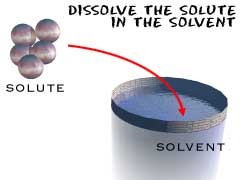What do solvents do to solutes? What phases can solutions be made of?
1 Answer
Jul 18, 2016
Solvents dissolve solutes. They are usually the substances that there are more of than the solute in a solution, and they are often a different phase (solid/liquid/gas) than the solute---though they don't have to be.
Usually, we think of solvents as fluids, which can be liquids or gases.
 http://chem4kids.com/
http://chem4kids.com/
So, if you wanted...
- You could dissolve (solid) salt,
"NaCl" , in a lot of (liquid) water,"H"_2"O" , and water would be the solvent. - You could dissolve ammonia gas,
"NH"_3 , in a bunch of n-hexane liquid,"C"_6"H"_14 , and n-hexane would be the solvent. The n stands for "neo", and emphasizes that it is"H"_3"C"-("CH"_2)_4-"CH"_3 . - You could dissolve (liquid) benzene,
"C"_6"H"_6 , in large quantities of (liquid) toluene,"C"_6"H"_5"CH"_3 , and toluene would be the solvent.
Any of these count as solutions. These are respectively a solid-liquid solution, a gas-liquid solution, and a liquid-liquid solution.

